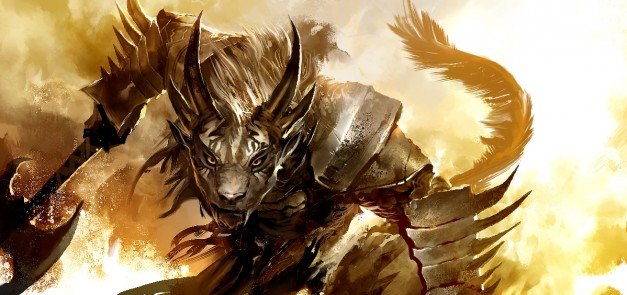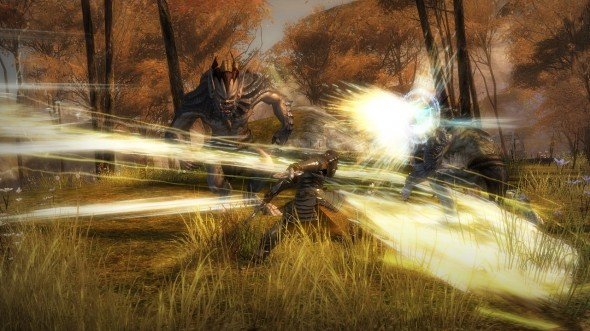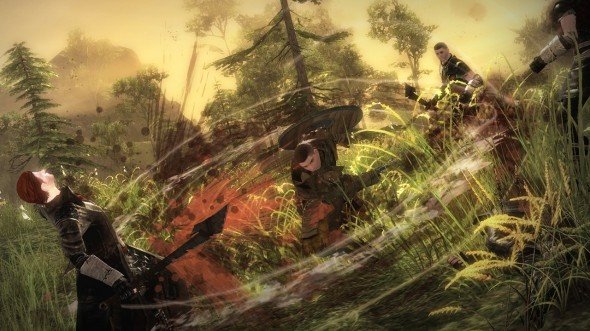Guild Wars 2: the kitchen sink post

What? You thought that just because we finished posting our cover story online that we couldn't possibly have more details on Guild Wars 2? You couldn't be farther from the truth! How about the fact that Lead Game Designer Eric Flannum told us, "We get inspiration from movies too, books, everything. It's always looking all over the place to gain inspiration." Even YouTube? "Yeah, YouTube." Bam! Just like that, you've got even more GW2 nuggets in the brainpan. Let's just hope that the Lincoln Park rapist doesn't find his way into one of the dungeons.
Crave more? Antics, random factoids about the game and its development, and everything else I swept off the cutting room floor from the hands-on and dungeon reveal posts are after the break.
With every decision ArenaNet makes, the judgment leans on the side of player forgiveness. That's not to say GW2 is aiming to be easier than other MMOs, though certain aspects seem like they will be easier, it's just that when it comes down to it, Flannum says, they're looking to make a game that's "more outright fun." From the roles you'll assume, to the dungeons you'll brave, to the NPCs you'll interact with, ArenaNet's flexible design diminishes barriers in an effort to empower players to play how they want to play.
Know your role

To explain how blurry the lines of class distinction can become during a fight, Flannum tells a story from play testing: "Players are capable of taking care of themselves and filling different roles... For example, there was a time when one of the dungeons when we were play testing it, a couple of the other designers and I were going through and we had a group consisting of two Warriors and a Ranger, and we were going through and we were actually supposed to have five people, but we couldn't get a group together so we ended up with three. We fought this boss encounter that was a little overbalanced at the time where it was, this is why we test things. But we ended up getting through the boss encounter when groups of five people couldn't. We did it through really smart use of our abilities. The other two designers were very good players. I'm not going to say I'm a good player--I mostly got through by playing with them. So what we ended up doing was we had this system where I was the human specced as a Warrior to do ranged damage and had a bow and rifle, and the Ranger was speced to do range damage. And we had this one Warrior who would do things like he would get attention of the bad guys, try to kite them by hamstringing them. I would use barrage to cripple them, and then we would basically try to keep their attention, ping-ponging between the three of us, and none of us were obviously support-oriented, but we were able to use all the tools we had at our disposable in order to win the fight... We had to recognize when the Ranger, who was a little bit squishier, had gotten the attention of the boss, and we had to recognize that 'Ok now the Ranger is going to get his attention, the Ranger might even go down, and it's up to one of the Warriors to grab his attention away when the Ranger goes down, the other Warrior can go resurrect him.' What ends up happening is you get these things were you don't have these really rigid group dynamics where you go into it 'You are the tank, I am the healer.' What ends up happening is that the situation changes moment to moment and you have to react to how the situation is changing, and we hopefully give every player a bunch of tools in their toolbox to react to different situations.

"There's actually a lot of opportunity for individual heroics in the battle" Flannum continues, "because you get the whole 'Ok, everybody except one guy is down now'--that doesn't mean that you're done. That one guy who's left, depending on what profession he is, what skills he has, there's a lot of things that he can do. We've experienced that in our playthroughs. We've had a group of five guys and the last person down manages to pull off super awesome things, like a Warrior with Vengeance [which makes him invulnerable for a short time] will use it to resurrect an ally, and the ally will use the Mist Form [Elementalist ability], which gives him temporarily invulnerability, to go get someone else back up, and so on and so forth. So the idea is that we wanted our game to be about taking risks and about having fun, and not be a game about worrying about making a mistake. We didn't want that like 'Oh crap, if I make a mistake here, our entire group is doomed.' We wanted it to be more like 'Ok I just made a mistake, now how do I redeem that mistake? How do we get out of this bad situation that we got in?'”
For all GW2's weapon swapping and profession ambiguity, Flannum says "It's actually going to be pretty fast relatively, in MMO terms, to get through our game." He says replayability is the key. Because there are so many options in how you approach a situation, parties will be hard pressed to experience the same thing twice. "I don't think we look at one thing being the end game. Again, I think we see that people have different styles of play... we want to provide some end game content for all the different styles of play that we see." Once players have "completed" the game, there is always the opportunity to go back and discover how the other professions play through alts, as well as PvP.
Keep up to date with the most important stories and the best deals, as picked by the PC Gamer team.

